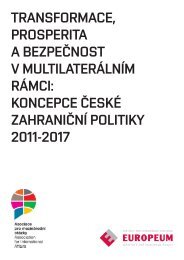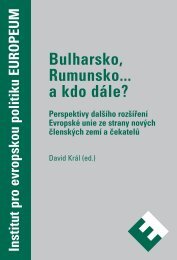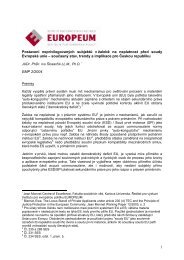eu constitutionalisation - EUROPEUM Institute for European Policy
eu constitutionalisation - EUROPEUM Institute for European Policy
eu constitutionalisation - EUROPEUM Institute for European Policy
Create successful ePaper yourself
Turn your PDF publications into a flip-book with our unique Google optimized e-Paper software.
Chapter 5: The <strong>European</strong> Constitution and the Re<strong>for</strong>m of External Competencesprojects”. Similar to other fields of the CFSP/CSDP, the Agency bringsabout an interesting constellation regarding the institutions involved.The Agency’s statute, seat and operational rules is to be defined by theCouncil, acting by qualified majority (Art. III-311(2) CT).⁵⁵ The Agencyitself shall act subject to the authority of the Council (Art. III-311(1)),which presumably refers to the Foreign Affairs Council and hence theUnion Foreign Minister, and at the same time shall carry out its taskin liaison with the Commission where necessary (Art. III-311(2) CT).Remarkably, even be<strong>for</strong>e the <strong>for</strong>mal signing of the treaty, the Councilhas already adopted a joint action establishing the <strong>European</strong> DefenceAgency on the basis of Art 14 TEU with the mission to support the Counciland the member states in their ef<strong>for</strong>t to improve the EU’s defence capabilitiesin the field of crisis management and to sustain the ESDP.⁵⁶In summary, the constitutional treaty includes important amendments tothe CSDP, particularly by broadening the Union’s competences throughthe extension of the Petersberg tasks and including several new legal basesallowing <strong>for</strong> a flexible integration and, thus, the possibility <strong>for</strong> a strongerprogression of “coalitions of the willing” in the defence sector.⁵⁷ Takentogether with the comprehensive obligations of mutual defence andsolidarity assistance, it may be concluded that one “achievement” of theConstitution would be to strengthen the legal foundation <strong>for</strong> a commondefence policy to a considerable degree.55) Presumably, all member states and not only the participating states shall take part in the decision-making,as the following sentence explicitly requests that “that decision should take account of the level ofeffective participation in the Agency’s activities.56) Council Joint Action 2004/551/CFSP of 12 July 2004 on the establishment of the <strong>European</strong> DefenceAgency, OJ L245/17 of 12 July 2004; <strong>for</strong> a more detailed outline on the <strong>European</strong> Defence Agency referto BLANCK, K. (2005), Flexible Integration in the CFSP (EI-Working Paper, Europainstitut, Vienna Universityof Economics and Business Administration), p.27ff.: Notably, Blanck points out that the cooperationprogrammes envisaged through the Agency and the option to set up exclusive industrial arrangementsfind itself in direct opposition to the Nice Treaty provisions excluding enhanced cooperation from issueshaving military or defence implications.57) Another indication <strong>for</strong> a more efficient operation of the CSDP is the provision on financing in theConstitution (Art. III-313 CT). Principally the Constitution maintains the approach of charging expenditurearising from operations having military or defence implications to the member states in accordance withtheir respective gross national product scale. Yet, <strong>for</strong> the urgent financing of initiatives in the frameworkof the CFSP, and particularly preparatory activities <strong>for</strong> the Petersberg tasks, the Constitution <strong>for</strong>esees theestablishment of specific procedures guaranteeing rapid access to appropriations in the Union budget(Art. III-313(3)). In addition, in order to finance preparatory activities <strong>for</strong> Petersberg tasks, a start-up fundmade up of member states’ contributions shall be established.170Chapter 5: The <strong>European</strong> Constitution and the Re<strong>for</strong>m of External CompetencesV.3. Chapter III: The Common Commercial <strong>Policy</strong>(Art. III-314 and III-315 CT)Chapter III of Title V on the common commercial policy contains twoprovisions: Art III-314 CT on the establishment of a customs union betweenthe member states and Art. III-315 CT which constitutes the considerablyamended version of current Art 133 TEC. In the external sphere, the customsunion as well as the common commercial policy is explicit exclusivecompetence as specified by Art. I-13(1)(e) CT.Article III-314 CT essentially reflects Article 131 TEC with the significantcomplement, however, that it shall also contribute to the progressiveabolition of restrictions on <strong>for</strong>eign direct investment and to the lowering ofcustoms and other barriers. As Herrmann provides, the inclusion of nontariffbarriers and <strong>for</strong>eign direct investment (hereinafter: FDI) in the scopeof the common commercial policy constitutes another indication <strong>for</strong> theambitious and comprehensive global commercial policy aspired by theCT. It corresponds to the extension of the Union’s objectives in the fieldof external action through Art. III-292 CT which, in his view, constitutesan expression of the Union’s aspiration at international level to find anddefend its own consensus on the equilibrium between economic and noneconomictrade aspects towards the outside world.⁵⁸ With a view to theseobjectives, agreements concluded under the CCP might, in the future,also be reviewed with regard to their capacity of furthering sustainabledevelopment. It is also questionable, how trade agreements with countriesthat do not respect human rights should be legally evaluated in the light ofthe human rights-objective under Art. III-292 CT.Also, the amendments to the scope of the CCP in Art. III-315 CT wouldbring about a significant development in the sphere of the internationaleconomic law. Currently, the Union’s competences under the commoncommercial policy in Art 133 TEC include the adoption of tariff rates,quantitative restrictions, anti-dumping measures, anti-subsidy measuresagainst unfair trade practices, export policy and the conclusion of tariff andtrade agreements. With regard to the WTO-agreement, the ECJ clarified inOpinion 1/94 that besides the agreement on trade in goods, only selected58) HERRMANN (2004), pp. 175 ff; CREMONA (2003), p.1349.171








